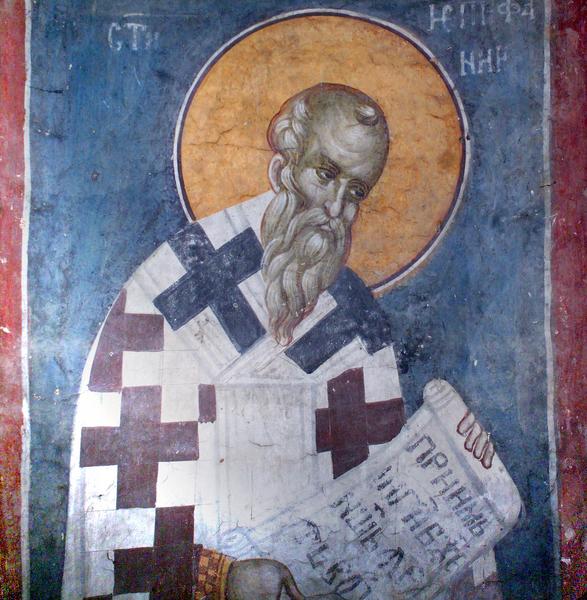- Epiphanius of Salamis
Infobox Saint
name=Saint Epiphanius
birth_date=ca. 310-320
death_date=403
feast_day=May 12 , 17 Pashons (Coptic Orthodox )
venerated_in=Eastern Orthodoxy Oriental Orthodoxy Roman Catholicism 
imagesize=250px
caption=Icon of St. Epiphanius (Gračanica monastery ,Kosovo )
birth_place=Judea
death_place=at sea
titles=Bishop of Salamis (Cyprus), Oracle of Palestine
beatified_date=
beatified_place=
beatified_by=
canonized_date=
canonized_place=
canonized_by=
attributes=Vested as abishop inomophorion , sometimes holding a scroll
patronage=
major_shrine=
suppressed_date=
issues=Epiphanius (ca. 310–320 – 403) was bishop of Salamis and metropolitan of Cyprus at the end of the 4th century AD. He is considered a
Church Father . He gained the reputation of a strong defender of orthodoxy. He is best known for composing a very large compendium of the heresies down to his own time, full of quotations from them.Ecclesiastical Life
He was born into a
Jewish family in the small settlement of Besanduk, nearEleutheropolis ,Judaea , but converted toChristianity , and lived as amonk inEgypt , where he was educated and came into contact with Valentinian groups. Returning toJudaea around 333, when still a young man, he founded a monastery at Ad nearby [The more famousMonastery of Epiphanius nearThebes, Egypt was founded by ananchorite named Epiphanius towards the end of the sixth century; it was explored by an expedition from theMetropolitan Museum of Art , 1912-14.] which is often mentioned in thepolemics ofJerome withRufinus and John, Bishop of Jerusalem. He wasordained apriest , and lived and studied as superior of the monastery for thirty years. He became versed in several languages including Hebrew, Syriac, Egyptian, Greek, andLatin and was called by Jerome on that account "Pentaglossis" ("Five tongued").His reputation for learning prompted his nomination and
consecration asBishop ofSalamis, Cyprus [Salamis was also known as Constantia after Constantine II.] in 367. He was also the Metropolitan of theChurch of Cyprus . He served as bishop for nearly forty years, as well as traveling widely to combat unorthodox beliefs. He was present at a synod inAntioch (376) where theTrinitarian questions were debated against the heresy ofApollinarianism . He upheld the position of Bishop Paulinus, who had the support ofRome , over that ofMeletius of Antioch , who was supported by the Eastern Churches. In 382 he was present at theCouncil of Rome , again upholding the cause of Paulinus. During a visit to Palestine in 394 he attackedOrigen 's followers and urged the Bishop ofJerusalem to condemn his writings. Origen's writings were eventually condemned at theFifth Ecumenical Council in 553. When Epiphanius was nearly 80, in 402, at the behest of Bishop Theophilus of Alexandria, the saint went toConstantinople to support Theophilus in his campaign againstSaint John Chrysostom , and the four "Tall Brothers." When he realized he was being used as a tool by Theophilus against Saint John Chrysostom, who had given refuge to the monks persecuted by Theophilus and who were appealing to the emperor, Epiphanius started back to Salamis, only to die on the way home in 403.Writings
His earliest known work is the "Ancoratus" ("the well anchored man"), which includes arguments against
Arianism and the teachings ofOrigen .His best-known book is the "
Panarion " which means "Medicine-chest" (also known as "Adversus Haereses", "Against Heresies"), presented as a book of antidotes for those bitten by the serpent of heresy. Written between 374 and 377, it forms a handbook for dealing with the arguments of heretics. It lists 80 heresies, some of which are not described in any other surviving documents from the time. While Epiphanius often let his zeal come before facts - he admits on one occasion that he writes against the Origenists based only on hearsay ("Panarion", Haeresis 71) - the "Panarion" is a valuable source of information on the Christian church of the fourth century. The "Panarion" was only recently (1987 and 1990) translated into English.Aside from the polemics by which he is known, Epiphanius wrote a work of biblical
antiquarian ism, called, for one of its sections, "On Measures and Weights" (περί μέτρω καί στάθμων). It was composed in Constantinople for a Persian priest, in 392. [Allen A. Shaw, "On Measures and Weights by Epiphanius" "National Mathematics Magazine" 11.1 (October 1936: 3-7).] The first section discusses the canon of theOld Testament and its versions, the second of measures and weights, and the third, the geography ofPalestine . The texts appear not to have been given a polish but consist of rough notes and sketches, his modern editor, Allen A. Shaw, concluded; nevertheless Epiphanius' work onmetrology was important in theHistory of measurement .The collection of homilies traditionally ascribed to a "Saint Epiphanius, bishop" are dated in the late fifth or sixth century and are not connected with Epiphanius of Salamis by modern scholars. [Alvar Erikson, "Sancti Epiphani Episcopi Interpretatio Evangelorum" (Lund) 1938, following Dom Morin.]
Works
*"The Panarion of Epiphanius of Salamis, Book I (Sects 1-46)" Frank Williams, translator, 1987 (E.J. Brill, Leiden) ISBN 90-04-07926-2
*"The Panarion of Epiphanius of Salamis, Book II and III (Sects 47-80, De Fide)" Frank Williams, translator, 1993 (E.J. Brill, Leiden) ISBN 90-04-09898-4
*"The Panarion of St. Epiphanius, Bishop of Salamis" Philip R. Amidon, translator, 1990 (Oxford University Press, New York) ISBN 01-95-06291-4Notes
External links
*CathEncy|url=http://www.newadvent.org/cathen/13393b.htm|title=Epiphanius of Salamis
* [http://www.tertullian.org/fathers/epiphanius_weights_03_text.htm Epiphanius, On Biblical Weights and Measures] English translation of a Syriac text
* [http://www.tertullian.org/rpearse/epiphanius.html Some excerpts from the "Panarion"]
* [http://essenes.crosswinds.net/panarion.htm Further excerpts from the "Panarion"]
* [http://www.ccel.org/fathers/NPNF2-06/letters/letter51.htm Letter from Epiphianus, Bishop of Salamis, in Cyprus, to John, Bishop of Jerusalem]
* [http://www.documentacatholicaomnia.eu/30_20_0320-0403-_Epiphanius_Salaminis_Episcopus.html Opera Omnia by Migne Patrologia Graeca with analytical indexes]
Wikimedia Foundation. 2010.
